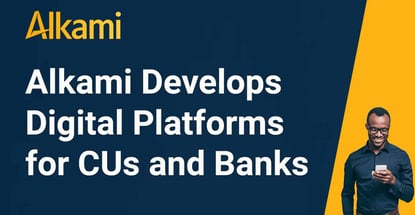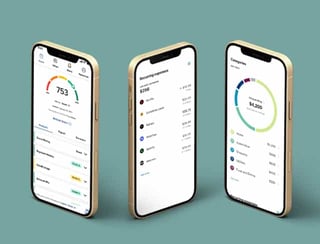
Our experts and industry insiders blog the latest news, studies and current events from inside the credit card industry. Our articles follow strict editorial guidelines.
In a Nutshell: Alkami creates customized digital platforms for credit unions and banks. The fintech company considers the priorities of financial institutions before developing white-glove solutions that address each client’s unique situation. Financial institutions have seen a significant increase in digital adoption during the COVID-19 pandemic. Since community and regional banks and credit unions have fewer resources than the four U.S. mega-banks, Alkami provides the tools they need for digital adoption.
In September 2020, at the height of the COVID-19 pandemic, Alkami was named to the CB Insights Fintech 250, a list of some of the most promising fintech companies. The B2B company is unique in the space because it helps banks and credit unions of all sizes offer users innovative digital products that improve banking experiences.
“Users are paying more attention to their finances, and they have to do so remotely. Being recognized for our achievements in delivering this with the Alkami Platform is really a reflection of how successful and remarkable our clients are,” said Stephen Bohanon, Alkami Co-Founder and Chief Strategy and Product Officer, when announcing the accolade.
Alkami celebrated its 13th anniversary in 2022. Bohanon has worked in the financial services and tech industries since 1997. He began his career at a small software company that worked on check processing and imaging software for banks and credit unions.

Later, he was working for a consulting firm that worked on vendor evaluations.
“We invited the vendors in, and they answered the RFPs, what they do, what their price is, they demonstrate their software. Then, the people making the decision say what they liked and what they wish they had. There was often a disconnect between what the customer is wanting and what is actually out there in the provider market,” said Bohanon.
Bohanon decided to start Alkami after seeing that void in the market. He said he had a vision for what the next generation of online banking would be like.
Specifically, he wanted to focus on UI design and user experience. He also wanted to develop the Alkami Platform, a cross-platform system that leverages data to understand customers and promote relevant content, including financial literacy resources and product information.
“Those were the pillars of our system, the reason we exist. Within a few months, we built a prototype and then got someone to commit to say, ‘If you can build that, we’ll buy it,’” Bohanon told us.
A Growing Base of Clients and Users
Alkami has just under 200 B2B clients that serve 13.3 million users who bank on the platform. On average, each financial institution has about 70,000 users. Alkami employs 840 Alkamists, the name the company has given its experienced staff members who work with clients.
There are around 9,500 financial institutions in the United States, roughly split between credit unions and banks, and Alkami serves a significant number of both.
Alkami aims to help community and regional banks and credit unions compete with the few large banks that have the resources to build their own digital solutions in-house.
“Smaller institutions don’t have the scale, or in many cases, they don’t know how to build their own digital offering. So, they rely on Alkami and take part in our R&D. Then, we have a white label solution that they can offer as their own,” Bohanon told us.
Implementing a custom solution for each financial institution can take between six and 12 months, depending on its size and the complexity of its request.
Digital banking platforms are designed to integrate with back office systems. Then, users can navigate to the platform to perform all the functions they may have once relied on a physical location to complete.
“Consider how our system takes a check. You’re allowing your user to enter the amount, but then we’re actually submitting that through API’s to a separate vendor who handles the check process. So, our job is to integrate all these systems,” Bohanon said.
Offering Comprehensive and Tailor-Made Solutions
Alkami continues to develop new functionalities and now offers more than 30 products. The types of products institutions request depend on their individual goals.
For example, some banks focus on card interchange revenue, so they want to have several card management features, including rewards and card control features. Often, credit unions and banks focus on financial wellness. That means they often want to offer products based on credit score reporting, monitoring, budgeting, tools, savings goals, and other key tenets of financial literacy.
Institutions also want to ensure members and customers know about the relevant financial products and services they offer.
“Their focus is trying to take that auto loan only customer and turn them into someone that has a checking account and gets their direct deposit there. So they’ve really focused on cross-selling to their indirect base,” Bohanon said.

Many modern financial institutions prioritize the growth of their digital banking channels. Institutions understand they need to scale up their offerings because their channels often handle a high percentage — sometimes more than 90% — of interactions with users.
Another shift is that banks and credit unions want their digital solutions to pay for themselves. They want this channel to drive enough revenue that it pays for the service aspect of it.
“What’s happening now is it’s shifting to more of a sales and growth channel, where it’s serving people. How do we use the data that we have? What do users click on, and what do they ignore? How do we suggest the right products or the right content?” Bohanon told us.
The COVID-19 pandemic spurred Alkami’s growth because many financial institutions needed to expand their digital offerings. An institution grows by 8% or 9% per year, on average, and its digital user base increases at the same rate.
“Alkami was always out around 13% to 14%, so we were always beating the averages. But during the pandemic, what you saw is that the average went from 9% to 12%, and we went from 14% to 17%,” Bohanon said.
Alkami Prepares Financial Institutions for the Future
Alkami is in the midst of expanding from a company solely focused on digital banking to one with three main pillars to better serve its regional and community financial institution clients and enable them to compete on an even footing with a field that now includes not only megabanks, but neobanks, fintechs and Big Tech alternatives.
That first pillar, digital banking, is strong and getting stronger. Alkami started with the basics—accounts, bill pay, transfer. But it continues to add digital banking options, with peer-to-peer, financial wellness, and integrated business banking support. In fact, Alkami supports 400,000 business banking accounts across its client banks and credit unions, more than 60% of which now use Alkami’s business banking services.
The second of the three pillars is an unleashed Alkami Platform. The Platform currently has some 60 API endpoints supporting 110 different business functions. Alkami’s significant expansion into business banking includes B2B APIs that enable businesses to update their customer information, passwords and other account details directly from CRM systems such as Salesforce.
In addition, Alkami has rolled out an all-new mobile Platform. It uses the Flutter cross-platform framework to deliver new features simultaneously on iOS and Android.
There’s also now a mobile-native Alkami SDK. And the Platform is integrated with the Alkami design system, including theme builder and nav builder functions, so that client banks and credit unions can easily customize their mobile banking options. That’s critical given that 65% of digital banking logins are now happening on mobile. For a growing number of clients, mobile banking is digital banking.

The third of the three pillars is financial services data. With the acquisition of Segmint this year, which mines transaction data to supercharge personalized product offerings. Segmint only had a handful of customers that overlapped with Alkami, so the company grew from capturing data for 12 million account holders to a total of 27 million after Segmint’s 15 million were added to the database.
That is megabank territory, and Alkami helps client banks and credit unions leverage that data to get to know their users better, generating consumer insights (called Key Lifestyle Indicators) that predict which additional products might be most appealing to account holders. The KLI insights are passed along for FIs to deploy in email offers through marketing automation and via highly relevant, personalized offers users are served on their websites and mobile apps.
When all three of these pillars are brought to bear to improve user experience and increase the ROI of banks and credit unions, Alkami’s expanded vision is at its best. Bohanon gives the example of Segmint seeing a retail user making a payment from her account to a Capital One business card.
That action triggers the creation of a KLI for that customer as a potential business owner. That then gets her added to a potential business owner target list, which is sent to the Alkami Platform’s digital banking CMS. The next time that user logs in on the new Alkami app to check her retail account, she’s served an ad headlined Make Your Business Soar.
The KLI was accurate, so the user clicks on the offer, decides to open a business account via Alkami Ignite, and chooses her Capital One account as the funding account, which flows via API into her digital banking profile. And now her new digital banking experience gives her the same retail account service she’s used to, but also includes her business account service options.
“We do not want America to become like other countries, where you basically have three to eight large institutions. When that happens, it’s not good for the consumer, it’s not good for small businesses that need loans. Regional community financial institutions are really the backbone of small businesses in America,” Bohanon said.

![11 Banks That Offer Secured Credit Cards ([updated_month_year]) 11 Banks That Offer Secured Credit Cards ([updated_month_year])](https://www.cardrates.com/images/uploads/2022/12/Banks-That-Offer-Secured-Credit-Cards.jpg?width=158&height=120&fit=crop)
![3 Credit Cards For Kids & Ways to Help Them Build Credit ([updated_month_year]) 3 Credit Cards For Kids & Ways to Help Them Build Credit ([updated_month_year])](https://www.cardrates.com/images/uploads/2022/03/Credit-Cards-For-Kids.jpg?width=158&height=120&fit=crop)

![6 Credit Strategies to Help You Financially Prepare for the Holidays ([current_year]) 6 Credit Strategies to Help You Financially Prepare for the Holidays ([current_year])](https://www.cardrates.com/images/uploads/2019/10/Holiday-Credit-Strategies-Feat.jpg?width=158&height=120&fit=crop)

![12 Ways Credit Cards Help Save on Vacations ([updated_month_year]) 12 Ways Credit Cards Help Save on Vacations ([updated_month_year])](https://www.cardrates.com/images/uploads/2022/05/Ways-Credit-Cards-Help-You-Save-on-Summer-Vacations.jpg?width=158&height=120&fit=crop)
